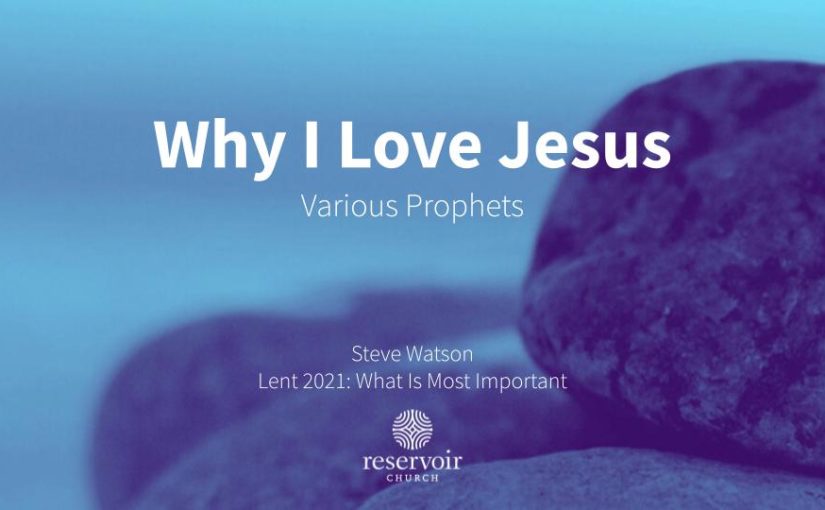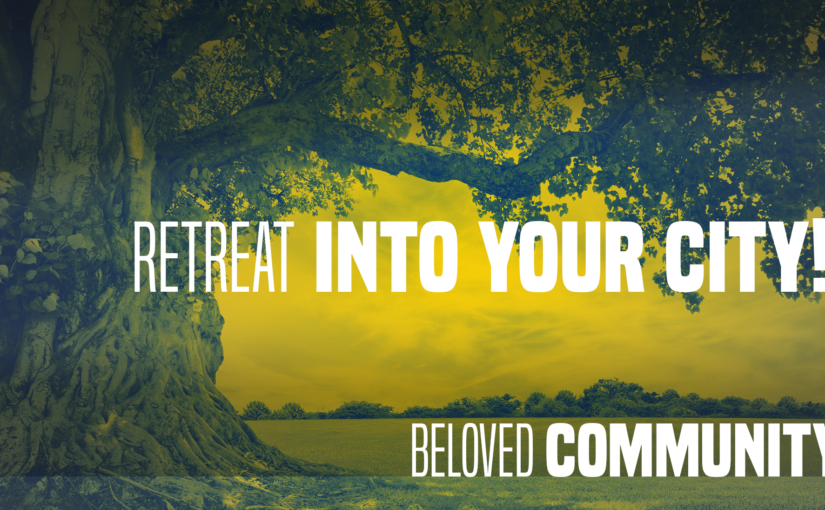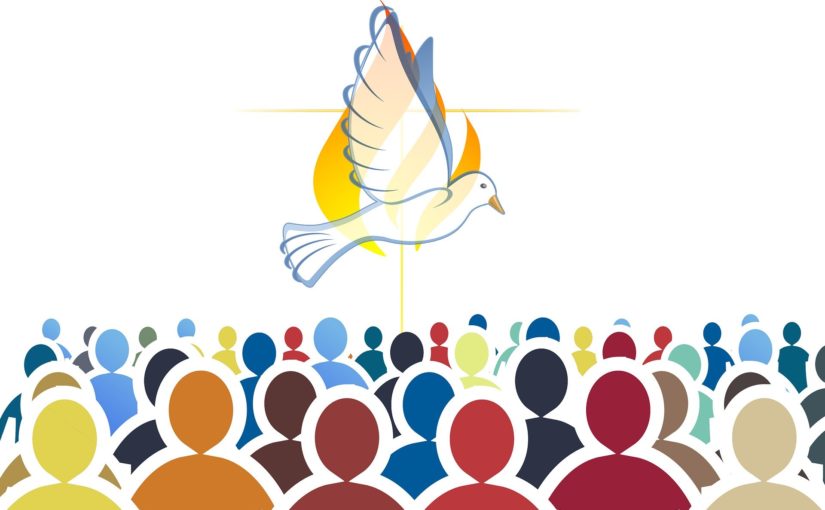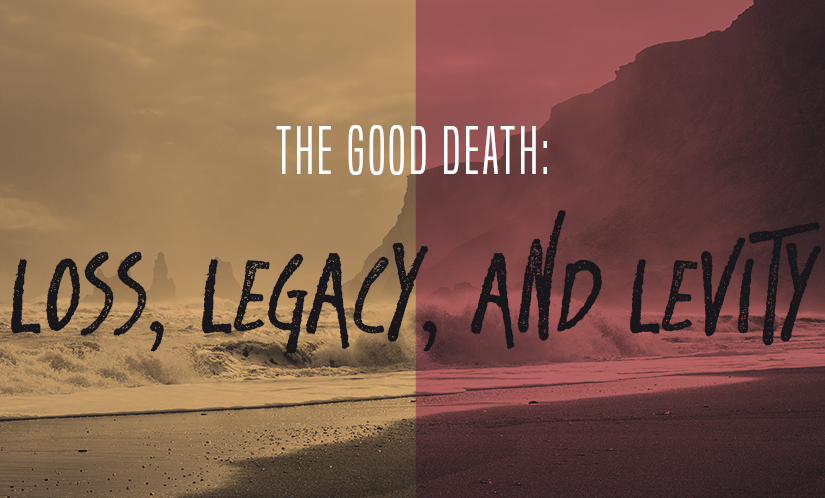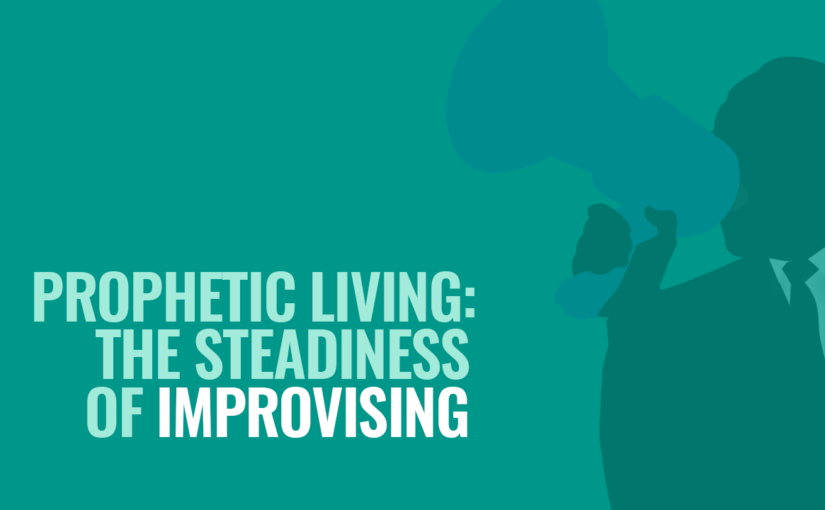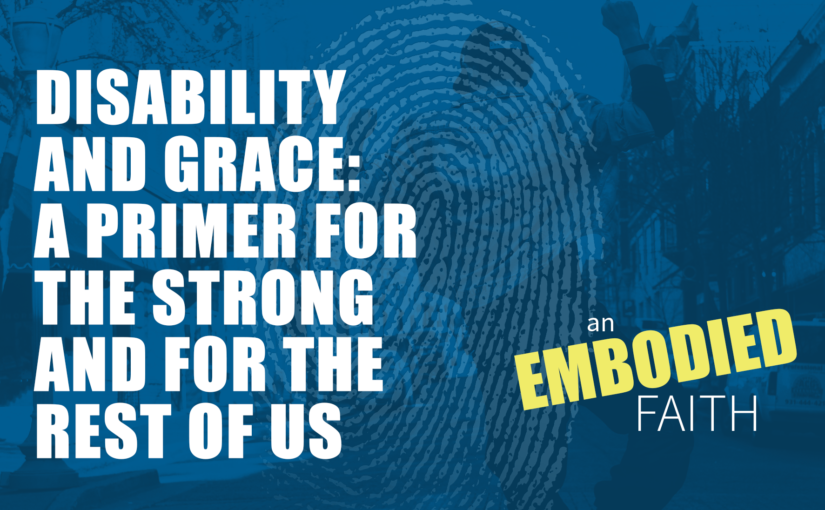For this week’s Events and Happenings, click “Download PDF.”
For this week’s spiritual practice led by Ivy Anthony, Seeds, click HERE.
We’re entering the sixth and final week of Lent, the week that in the Christian tradition has often been called Holy Week. As you’ve heard, this Friday and this Sunday, you’re invited to both in person and online opportunities to gather, to reflect, to worship in response to both the death and the resurrection of Jesus that we remember at the end of this week. This is a great time to remember and to love Jesus. And that’s what I want to talk about today.
For the past five weeks, we’ve read along with the Bible’s minor prophets, asking – What is most important?
We’ve heard the prophets say things like:
“Let justice roll down like water and righteousness like an ever-flowing stream,” and we’ve wondered what it looks like to be people of good intentions and good impact in the world.
We’ve heard:
“I desire mercy and not sacrifice,” and wondered what kind of religion God loves and what kinds God hates, and what it would be like to have more love and kindness at the center of our lives.
We’ve read the prophets get poetic about the world as it should be, imagining the beautiful beloved community reign of God on earth, where there is more than enough for everyone. And we’ve wondered what steps are ours to take to see that into being, and we’ve asked of God with the prophets:
Why not now? And how long?
We’ve remembered there are so many ways to hate God in this life, but there are so many ways to love God too.
And in this final week, we’ll read short excerpts from four different prophets. Each day, we’ll read words that centuries after they were first spoken and written became important to the first followers of Jesus. These words helped them understand who Jesus was and is and what happened in the final days of Jesus’ life and in the days and weeks after Jesus’ resurrection.
This week’s five passages are not “about” Jesus per se. They were all written by people centuries before Jesus, about other things, to other people, in other times. When we read the Bible, we’re reading other people’s mail. In the New Testament of the Bible, we’re reminded that those of us who follow Jesus but are not Jewish are like branches grafted into an older tree. We didn’t come first, we’re not part of the original people of God in this faith. Not everything is about us.
But each of these passages have also been windows for followers of Jesus into some way God was moving in the life of Jesus Christ. And at least for me, these passages remind me of reasons I love God, reasons I love the God Jesus loved, and reasons I love Jesus too.
So this week, I’m not going to speak about one passage in depth. I’m going to read a few different quotes from the passages in the final week of our Lenten guide. And I’ll share a few reasons why I love Jesus. On this Palm Sunday, the day Jesus took center stage in Jerusalem in the final week before he was rejected and crucified, I will share some of why I love Jesus. And as the city welcomed Jesus on Palm Sunday, I hope that we will all welcome the presence of God in Jesus to us and that Spirit of God might stir love in all our hearts today as well.
So, why I love Jesus.
Joel 2:25a, 28
25 I will repay you for the years
that the cutting locust,
the swarming locust, the hopping locust, and the devouring locust have eaten
28 After that I will pour out my spirit upon everyone;
your sons and your daughters will prophesy,
your old men will dream dreams,
and your young men will see visions.
As a prophet, Joel knew that people have really crappy things happen during crappy years in crappy seasons of life. Locusts swarm, and they don’t just get in your eyes and your sheets and in your crops, but they eat everything. They come in so many forms – the cutting ones and the swarming ones, and the hopping ones and the devouring ones. But they all darken the sky and devour your food and leave you aching with hunger and afraid you won’t make it through the winter to come.
I love Jesus because the locusts first came into my fields when I was just a kid but they weren’t the end of me. My locusts looked like anger and neglect and stealing stuff and kind of wishing I’d be caught and not knowing who to go to when things weren’t OK. And sometimes picking someone to go to but at least once that being the really, really, really wrong person. My locusts looked like ending up an invisible footnote in a horrible, sordid North Shore crime story that left me shamed and scared and all locked up inside.
I love Jesus, though, because spirit came to this young man, because Jesus made me part of the everyone God pours into. I love Jesus because he started saving me through so many people:
- Through Sunny Prior, my chorus teacher, who made me solo in front of dozens of my peers and smiled and told me: man, I could sing.
- Through Ken Jones, my English teacher who, while his kids and hopes were dying, made room for me. Validated the written expression of my thoughts and life, and gave a speech at my school where he talked about hope and the marvelous incomprehensibility of God.
- Through a sweet high school girlfriend who was kinder to me than I knew how to be to myself and said corny things about faith like how life was full of glimpses of heaven.
- Through a hokey old lady who told me Jesus would always love me and always be in my heart and through a pastor who made it seem like you could be smart and a Christian, even though I wasn’t really either of those things yet, and who baptized me.
- Through a string of teachers and bosses who saw more in me than I saw in myself, who blessed a hopeful future into being with their affirmations.
- Through my first therapist, who made me feel normal, and that what felt like my mess wasn’t really my fault at all
- Through my friends who heard me tell my stories – heavy, raw – and accepted me and kept on being my friends, even when they didn’t know what to say.
Spirit was poured out to me through the love and kindness of people that taught me I mattered, I was loved. And I love Jesus for all of them, and for all the ways he saved me, brought me out of the locust field and has never stopped wrenching good out of the evils that found me there.
This has been a year of swarming locusts. I’ve come back to this verse in prayer this year, shoving it in God’s face so to speak and asking God for redemption. But when I think of so many people and places that are ravaged by this crappy year we’ve had, I love Jesus because I have hope that this won’t be the end of the story. I love Jesus because Spirit of God has wrenched good out of evil in my life before, and I’m counting on God to help us wrench good out of evil after this locust-filled year too.
Zephaniah 3:17
17 The Lord your God is in your midst—a warrior bringing victory.
He will create calm with his love;
he will rejoice over you with singing.
I love Jesus because like me, and like all of us, he must have loved it when people sang when he was little. Lullaby songs – old, old religious songs about God and kings and good times and bad times and joy and anger, and funny songs about fig trees and pearls and lost people and lost sheep and lost coins. I love Jesus because he came from a people and from a faith that loved to sing, and I think that even though we don’t have any stories about Jesus singing, he must have sung by himself at night, or while walking along the road with his friends.
And I love Jesus because I imagine that God is somehow still singing lullabies, that God in Christ within and around and among us by God’s spirit still rejoices over us, rejoices over you with singing. I still can’t shake this feeling that someone is singing over us like this.
I found out I was a teenager that I loved to sing. Singing with other people made me feel alive, like my body and my voice were part of something strong and beautiful, a sound, a force, a presence made of nothing but waves in the air, but still, that can soften hearts and grow courage and bring you back to your best self and stir the masses and make one believe there must be a God.
I love Jesus because whether I was singing gospel or Bach or show tunes or the weirdest avant garde experiment, I always knew that calmness and joy and strength and beauty were our common human heritage, our way that we were meant to be. And I love Jesus because when I was 17 and pretending to be a 1950’s New York City Polish kid heads over heels in forbidden love, well, I remember lying dead on the stage after hours of belting love songs, and listening to Melina who played Maria in West Side Story make peace over my supposed corpse. I felt like life could be noble and good, and big and beautiful things could still happen among us. I still feel that way when I sing. I love Jesus for how art can stir us like that. And I love Jesus for what singing did for me, and I love that God loves music and loves to sing.
Malachi 4:6a
6 Turn the hearts of the parents to the children
and the hearts of the children to their parents.
I love Jesus because Jesus loves children, my children and your children or nieces or brothers or your neighbor’s kids and all the children of the world.
We live in a world that says it loves children that sing: I believe that children are the future, but then hates children. We want children to behave and be quiet, and be seen and not heard and be still and work hard and fulfill our dreams for them and shape them in our image. But Jesus said: let the children come to me. He liked being interrupted by children. He saw children. He healed children. I don’t know if there’s ever been a prophet who loved children like Jesus and that makes me love Jesus too.
Jesus understands what it’s like to love children, and parents. And Jesus understands what it’s like to have family problems and to grieve and to long for things to be better or have been better.
Jesus said that sometimes to follow life and follow love and follow Jesus and be well, that’s going to disrupt the family. I love Jesus for knowing that families are sometimes hard places and broken places. I love Jesus because when I wish my family had been different or was different, Jesus knows about that too. But Jesus also knows that the Spirit’s longing is to turn the hearts of parents to their kids and to turn the hearts of kids to their parents.
God knows how heart-breaking it is when parent’s hearts aren’t turned toward their kids or when kid’s hearts are turned against their parents. I love Jesus for understanding when that’s been true for me, and I love that God is holding out for us all to come around to one another, to see better, to heal better, to love better.
Zechariah 12:b
12:b They will look to me concerning the one whom they pierced;
they will mourn over him like the mourning for an only child.
I love Jesus because he didn’t take the easy way, because he’s not a winning team kind of person. I love Jesus because on the day we call Palm Sunday, he rode into the big city on a donkey, talking about real peace, there was a whole legion of Roman soldiers across town, marching into the city on warhorses, talking propaganda about the peace the money and weapons can buy you. I love Jesus because Jesus knew his life, his message of justice, reconciliation, dignity for the little person, utter disinterest in the bogus promises of capital and politics would get him killed, and he did it anyway.
I love Jesus because he suffered enough, and lived looking into people’s eyes and touching hands with empathy, that they called him Man of Sorrows. And I love Jesus because he got close enough to the shamed and blamed that he had this other nickname: Friend of sinners.
Who earns the nicknames Friend of Sinners and Man of Sorrows? I love Jesus for that. I love Jesus because I believe he cried with me in my freshman dorm room and sat and struggled with me while I lost weight and peace of mind. I love Jesus because I believe he walked out of my house with me when I had to leave and not look back. I love Jesus because I made a best friend named Grace who has been really kind and loyal and loving and faithful to me, and I love Jesus because he pushes me to be those things too.
And I love Jesus because when I’ve needed other friends and been lonely, other friends have come my way and Jesus has been my adult imaginary friend who’s real. I love Jesus for weeping with me when Nana and Pop Pop died and for being there at every funeral I’ve been to or led, even the ones I led through tears or shaky knees. I love Jesus because when I’m fed up or exasperated or angry about someone who’s so broken or self-sabotaging or so damn foolish, Jesus loves them more than me and sometimes turns my heart to be like his.
I love Jesus because I’ve found his Spirit in the woods and by the ocean and in prayers and meetings and in my classroom and in confessions and in the shadowed hallways of the ICE detention center and in hoarder’s houses and state house hallways and all the other places where I haven’t known just who to be or what to do.
I love Jesus because in Jesus, I know that God takes every suffering, every sigh, every tear, every indignity of experience on earth and brings it into the heart of God, let’s it impact the eternal mind from which all life begins. And I love Jesus because even when I’m afraid of failing or afraid of losing or afraid of dying, I know God will be there with me and know the way through it, for me and for us all.
Zechariah 13:1a
13:1a On that day, a fountain will open….
And I love Jesus because of the spring sunshine, and the meal a churchgoer offered to cook me. I love Jesus because a little tree is growing out of the patch of dirt where we buried our Bengal cat Azuma last year. I love Jesus because my son made sure we buried that cat, and my wife made a little garden plot on that ground – all this lovingkindness when I was too shocked, too sad to do anything.
I love Jesus because he’s alive, and because he makes me less afraid of dying. I love Jesus because he’s alive and is always birthing beautiful new things, always growing out of the soft and fertile places and the hard and stony places.
I love Jesus because my children and nieces and nephews and godchildren are all alive and becoming the most wonderful of people. I love Jesus because I used to be afraid my life wouldn’t amount to anything, and I’m not afraid of that anymore.
I love Jesus for the friend I was impossibly awful to who told me: I know what you did, Steve, and I forgive you, and showed me what Jesus looks like, always self-giving, co-suffering, always forgiving love. I love Jesus for showing us how very good God is. I love Jesus because God has become a fountain of life in me, made me bit by bit into a safe person, a gentler person, a kinder person. I love Jesus because Jesus shows me I’m so, so very loved, and that’s been filling up the holes in me that used to lie and sneak and harm and push me to the edge of despair.
I love Jesus because when I close my eyes or take a walk and move my hands from my heart and say: Jesus, hold my burdens, or Jesus, hold my worries, something really happens. Peace comes.
I love Jesus because no matter what the future holds, no matter what this next year brings, a river of life that is the person and presence of the living, life-giving God is flowing in me, is flowing in you, is welling up life and hope and faith and love like a reservoir, to pour into us and pour out of us again and again and again.
Thanks be to God.


